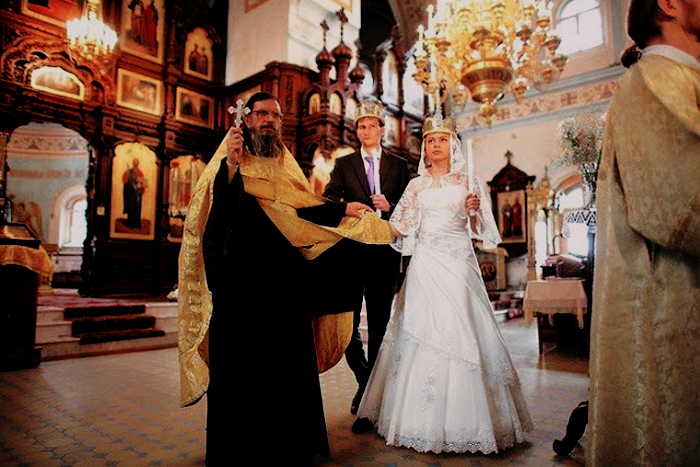
Why is the candy and flowers phase of a relationship so important? What qualities are necessary for a future spouse—husband and wife? What must they discuss with one another? How to deal with the inadequacies of our chosen one?
Hello, dear friends! We are continuing our cycle of conversations on the family. Today’s theme will be familiarity and relationships before marriage.
A time of extraordinary happiness
The time of falling in love and of relationships until marriage is that amazing season hymned by many poets and authors. When psychologists ask people to imagine and demonstrate what a smitten man experiences, usually most people show on their faces a feeling of flying—as some soaring bird. Incidentally, when they ask people to imagine love, usually they call for their partner and hug him, to show that they are not alone and that love is precisely the desire to do something for another, to comfort him, to caress him. And falling in love is rather the sort of euphoria that a man experiences because it is pleasing for him to be eternally near the other.
Elder Paisios of the Holy Mountain said this attraction—infatuation—is also created by God, and not accidentally, because two completely different people become as one whole in family life, and their differences, their dissimilarities, which will be especially manifested in the first years of marriage, should be overcome by just such a mutual attraction. Otherwise, without mutual attraction, the elder says, no one would be able to start a family, because this is a very, very complicated matter.
Thus, today we will be speaking about the most common questions connected with the theme of relationships before marriage, of falling in love.
These relationships are extraordinarily important. But today, regretfully, the majority of people (I don’t mean Orthodox people, thankfully) begin family life by living together. They are united in a common household, in common affairs, and of course, passion—the sexual attraction they feel for one another. But thereby they have skipped over a very important, very necessary period—the period of preparation for marriage, for the pre-marital period is the dress rehearsal, it is a “school for young soldiers” before entering into marriage. People have much to learn, and must discuss many important points with their future spouses, get used to another person, learn to build a mutual relationship with one another, learn more about one another, learn to forgive and endure and love and gently relate to one another.
This period is a period of courtship. We sometimes call this the candy-bouquet period. A young man says some sweet words to a young woman, gives her gifts, takes her hand when she is getting off the bus … And everyone wants to do something for another. And when a relationship immediately begins with cohabitation, everything is as if turned on its head: the man, the future head of the family is not taking care of the girl, but more likely the girl is taking care of the man, because she has a very serious motive for the relationship: to go, in the end, with her companion to the justice of the peace so that their common-law marriage would end with a real marriage. And what kind of family head will this man be, if everything from the very start of the relationship revolves only around him, if his companion does everything for him, gives him everything, and he has no obligations of any kind? He doesn’t even have the incentive or desire to do anything for her or to
serve her in any way!
serve her in any way!
The period of courtship helps people to unite, and to overcome the difficulties of the first years of marriage. How we will then remember this time! They’re the most amazing memories! And with what pleasure we will peruse our wedding photo albums then, with photos of your first joint trip on your honeymoon! I remember every time in our first year marriage when guests went to see even our distant relatives they would watch our wedding video, even, I admit, exhausting their guests with it. But to them it was apparently very important, although to others it was a little funny.
This time, the period of courtship, is always recalled with great gratitude and with some kind of nostalgia. And it’s very important, because in family life people should not forget about tenderness, about affection, about nurturing one another, and serving one another. And those who don’t forget about it preserve their familial happiness for many, many years.

If there’s a question of faith
Thus, a guy and girl meet, they like one another, they’re now dating, and even, maybe, are beginning to think about marriage. What issues need to be discussed before setting out to sea under the name of marriage? What should be found out about one another before the relationship becomes really serious? It’s a big mistake when people think that their companion possesses some kind of telepathic gift and will understand by himself everything you need and want. And those who think that as soon as they get on on the tracks of family life their engine will drive itself, and everything will be good for them, are mistaken. I repeat that it’s a huge mistake, and that it’s necessary to discuss the important points of common life before marriage.
In the first place it’s necessary, of course, that there would be a unity of faith between the spouses. People somehow forget about it and often remember it in marriage only when conflicts have already arisen: to go to church on Sunday or on a picnic? Where to take our kids on Sunday? … Before marriage they didn’t discuss it, but this question—the question of unity of faith, the question of Church life—is most important, because seek ye first the kingdom of God, and his righteousness; and all these things shall be added unto you (cf. Mt. 6:33). The rest is included if people look in one direction, if they walk to God together.
If there stands a question of faith, it is absolutely necessary to solve them before marriage. For example, if one of the future halves is an unchurched person, church him, and it’s necessary to go to church together, so that he might confess and commune for the first time in his life. It’s necessary to manifest some kind of missionary streak here to guide your chosen one to the Church, because if you don’t do it before marriage, then in marriage it’s unlikely that a person can change.

A real man, a real woman
What qualities should a spouse possess? For a girl it’s very important to see how her chosen one communicates not only with her—of course he will care for her and show her signs of attention. But how does he behave with other people? Is he able to make friends? Does he give up his seat on the bus, for example, to the elderly or pregnant women? It says a lot about a man. You have to see how he behaves with his parents. Why is this last point so important? Because we very often, in starting our families, act out our parents’ script. And if a man is rude with his parents, if he talks back to his parents, this conflict will find its way into your family, and after some time your spouse will address you just as rudely.
We need to look at the purely masculine qualities. Which are those? First of all, of course, is responsibility. A man must answer for his words, for his deeds, before God and before his family. Another critical quality for a man is diligence. Infantilism is a malady of many modern young people: they live off of their parents until they’re thirty, don’t want to receive an education, and don’t want to go to work. How will such a person feed and support a family?! But if we see a person constantly changing jobs, jumping from place to place—in Soviet times such people were called “drifters”—it’s also not good.
And now to talk about girls. Theodore Mikhailovich Dostoyevsky, when getting married after the death of his first wife, reasoned thus: which wife to choose—kind, beautiful, or smart? I will marry the kind one—she will love me and care for me. And kindness—it is the beauty of a woman’s soul—a very important feminine quality. It is in kindness precisely that femininity is found. Psychologists say that a woman is more inclined towards empathy and compassion. For her it’s natural to want to do something for her loved one.
What other qualities are important in a girl? Respect, and firstly respect for her parents. If a wife doesn’t respect her parents she won’t respect her husband either.
Love for children is another important feminine quality. Generally the question about how many kids to have—as many as the Lord gives, or two or three, should be discussed before marriage. Questions on the upbringing of the children are also necessary to discuss before marriage.

Don’t talk only about love
Much in marriage depends on what kind of family your future spouse grew up in: were they an only child, or, conversely, did they grow up in a large family. Because, as I already said, the script of your parents will be repeated in your families. Let’s imagine that a man grew up in a large family, but the girl was an only child, and not having younger brothers or sisters, she didn’t learn how to speak with children. And generally, for example, she wants a career because she received a wonderful education and wants to progress on this path, to work, to create, and so on. She absolutely doesn’t want to sit at home and raise children, however many the Lord gives. Therefore the question of how many kids is absolutely necessary to discuss, as I already said, before marriage, because it will be very difficult to talk about it in marriage.
So, to discuss the question of faith (which I already spoke about), the question about children, the question of who to live with—with parents or separately—is also very important. Alas, spouses often put this question—and moreover put it bluntly—only after marriage. “We will live only with my mother because that’s what I want, because for me it’s very comfortable, because my mama has looked after me my while life …” And the other half, for example, absolutely doesn’t want that: she has her own mother, or she wants to live separately—to build their own nest.
It’s also necessary to discuss other serious and important questions, because if before marriage people have unity, if they are concerned about the same things, if they talk about those things, then, naturally, they will also have something to talk and chat about in marriage.

How long to date before marriage?
How long to date and how? Experienced spiritual fathers have said that you should date no less than a year before marriage. I remember when I was studying in seminary, Fr. Kirill (Pavlov) gathered us seminarians, and we posed this question. He answered: a year. And Fr. John (Krestiankin) also said that having observed a person for a year and communicating with him, you will know. And what’s more, you need to communicate not on Skype, not on the internet, but in person. Of course people can meet in social networks, but it’s necessary, of course, to talk in reality—going on trips together, doing things together. It’s also good to do some volunteering together, to see each other in different situations, not just when we go to the movies with him, or when he says some nice words, but in various situations, interacting with different people.
Of course, it’s very good to meet the parents. It’s also a very important matter. A young woman came to me recently with a very difficult family situation. She said the main reason for this trying family situation is that until marriage she couldn’t even enter her future spouse’s parents’ house. Her fiancée’s parents were dead set against her, didn’t want to talk with her, which should have alarmed her long ago. She never even saw her future mother-in-law before the marriage—the first time was at their wedding. And now the mother-in-law quite seriously interferes in their family life, setting her husband against her, and so on. Of course, such problems should be resolved before marriage.
Why is it necessary to date for a year before marriage? Within a year a person will usually show his true face, his true self in various situations … And we know that even his mood, even his psychosomatic condition changes in different periods, for example, climactically: there are the notorious springtime-autumnal periods of aggravation for people with some kind of borderline mentality … We have an inclement and heavy climate, and a lack of sunshine too, by the way, which impacts a lot of people. We can meet with someone in spring, he can present himself very positive, bright, and joyful. And then, when we talk with him in winter, in our Muscovite winter, in the slush and mud, it turns out that he has a completely different character. Maybe his serotonin level jumps around like that…
In a year, as I already said, a man reveals not only his good qualities, for which we started to love him, but also those that aren’t so good, and we should get used to it, because we marry not only his strengths, but also his flaws—qualities which we can endure, that we can tolerate in marriage.
Who to change: yourself or the other?
But how to live with another’s flaws? Is it alright, having noticed something in your future other half, to fix it? And what if there are there flaws that reveal themselves in all their might in marriage? I’ll answer the first part of the question. Generally, to fix someone is not our business, but that of the person himself. We can influence a person by love, affection, and patience, but we can change only our own behavior. If somethings goes wrong, probably it’s we who didn’t behave so well. I repeat: to change someone else is a very, very difficult task.
Before marriage you should understand your chosen one’s peculiar flaws and whether you can reconcile with them. The strongest feelings of infatuation shouldn’t completely rob of us our reason. They partially rob us of our reason, of course … But it happens that a person doesn’t notice such obvious things—doesn’t want to notice, even though everyone tells him that his fiancée is absolutely not for him, doesn’t match him, and that he will have great problems with her. I remember a girl who everyone dissuaded from marrying a divorced man—behind his back was a previous failed marriage, he was much older than her and had problems with alcohol … She rushed into the maelstrom of love anyways, got married, and after a while they split: he left her with the children. It all ended because of precisely what she was warned about. But infatuation didn’t allow her to see his serious flaws.
What flaws, in my view, are incompatible with marriage, that is, that make it absolutely impossible to get married to a person as long as he hasn’t fixed them, or to very seriously reflect upon whether it’s worth it to connect your life with him? The passion for wine drinking (alcoholism) and even moreso drug abuse. The passion of lust—if we know that a man has on his shoulders several previous marriages and that he is generally very avid for the opposite sex, this very serious passion of his will hamper your marriage. The passion of despondency, the passion of anger—if we see before marriage that a man can’t control flaring up and yelling, or inclines towards despondency, often finding himself in some kind of melancholy or depression.
Marriage is of course a school where a man learns many things. But, as I already said, the period before marriage is a dress rehearsal, a “course for young soldiers,” and we should, precisely in this period, with so many of our flaws do battle and fix them. Because when someone lives alone, he is very often quite egotistical, that is, he likes everything about himself. He can sit quite late, for example, behind a computer until two in the morning playing games … But he should understand that when he enters into family life it will seriously annoy and discourage the other person. So we must struggle with such shortcomings even though they don’t seem to bother us.
So, we must prepare for marriage, inwardly fixing our life, directing it already towards family living. And therefore the period preceding marriage is very important.

Again about chastity before marriage
I will say a few words about chastity before marriage. If people begin to prepare for marriage by cohabitation, it very negatively affects their future family life. I say that as a person who is constantly analyzing family conflicts. At their core, more often than not, lies, precisely, an improper relationship before marriage. For Orthodox people this is all obvious: such relationships are a sin, violating the commandments of God. And this sin lays an improper, putrid foundation for your future. Of course, if a person repents, if he corrects his life, the Lord will give him a chance to revive the feelings in his marriage, to amend their lives. But I emphasize again: such pre-marital relationships hamper us quite seriously later in life.
We must understand where the fashion of so-called “common-law marriages”—cohabitation—came to us, and when it arrived. It came after the sixties, when schools introduced sex education. And we know very well who did it, who is paying, and why they promote these free relationships before marriage. I think it’s simply a program meant to destroy Christian morals. After all, it’s known, and, by the way, it’s shown by American research, that after cohabitating, divorce, conflicts, and unfaithfulness are two times more likely. That’s first. Second: people who are cohabitating do not want children for a very, very long time, women have many abortions, they take handfuls of
contraceptives, so that, in the end, many become infertile. I repeat: yes, it was a program aimed at destroying our families, at destroying our traditional foundations, at reducing the population of Christian nations. Why should we follow all of this? A man will never find happiness if he begins his life from sin.
contraceptives, so that, in the end, many become infertile. I repeat: yes, it was a program aimed at destroying our families, at destroying our traditional foundations, at reducing the population of Christian nations. Why should we follow all of this? A man will never find happiness if he begins his life from sin.
To be chaste and preserve purity before marriage is the norm. A bride is she who doesn’t “know yet”[1], as women were always called in Rus’, not yet having known her husband. She preserves purity and therefore she has a white dress. Naturally, chastity before marriage is also the norm for the male side of humanity.
On that I would like to end today’s talk.
Peace, kindness, and love to you all, my dears. May the Lord save you.




